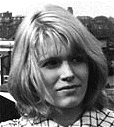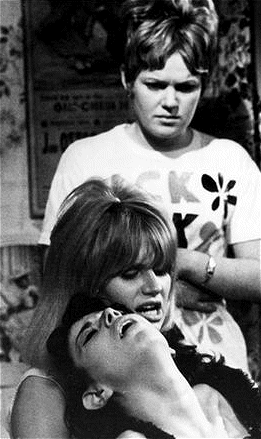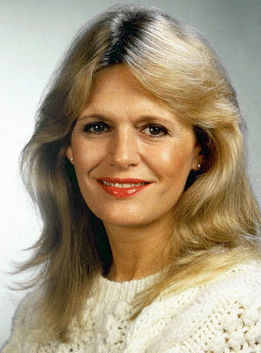She
divorced Lerner and married Mike Arnold, a carpenter. He proved to be
a volatile partner who often beat her and cost her film roles due to
his aggressive nature. The couple split up in 1984. Carol’s most memorable
performances were in ‘Up The Junction,’ ‘Cathy Come Home’ and ‘Poor
Cow’. In 1982 her career turned full circle when she appeared in the
West End play ‘Steaming’, which had been written by Nell Dunn and directed
by Roger Smith, the story editor of ‘Cathy Come Home’ and ‘Up The Junction.
She arrived in Miami in April 1991 and lodged in a cheap hotel room
at Ocean Grande. She hadn’t worked for nine years. She’d left California
haggard, her stomach distended through alcohol and cocaine use and her
looks had completely gone. She began living with nurse Sue Robbins in
a room with two beds, a TV, a cooker and a fridge. Her son Steve moved
from Los Angeles to join them. He found her coughing up blood in the
mornings. She then began coughing up blood by the bucketful and was
rushed to Mount Sinai Hospital with a massive ruptured oesophagus and
died on 16th September. Sean had arrived to join Steve and when he saw
her in the hospital, hooked up to a life support machine, he said, “I
couldn’t believe it – such a beautiful woman – what happened to her?”
Carol had wanted to be buried alongside her parents in Mortlake Cemetary,
London, but it would have cost $8,000 to freight her body there and
her sons had no money, so she was cremated and her ashes were sent by
mail. They were buried in her parent’s grave, but her sons were unable
to attend the ceremony as they didn’t have the money for the air fares.
During her career Carol’s other films included: ‘Circus Friends’, ‘Moby
Dick’, ‘Bon Voyage’, ‘An Alligator Named Daisy’, ‘Carry On Teacher’,
‘Carry On Doctor’, ‘Carry On Nurse’, ‘Prize of Gold’, ‘Beat Girl’, ‘The
Boys’, ‘Never Let Go’, ‘Surprise Package’, ‘Linda’, ‘All Night Long’,
‘Jailbreak’, ‘Around the World in 80 Days’, ‘The 39 Steps’, ‘A Hard
Day’s Night’, Slave Girls’, ‘The Fixer’, ‘Made’, ‘Some Call It Loving’,
‘The Squeeze’ and ‘Nutcracker’.


|
|







